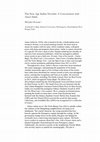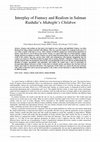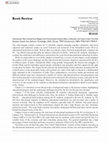Papers by Md Jakir Hossain

Postcolonial Text, 2024
This interview with Kochi-based Indian author Anees Salim was conducted via email over the course... more This interview with Kochi-based Indian author Anees Salim was conducted via email over the course of seven months, from April 2022 to October 2022. Anees has been a prolific, award-winning novelist who wrote seven novels within a span of ten years, despite facing numerous rejections from publishing houses. This conversation sheds light on Anees Salim’s significant works, which include Vanity Bagh, The Blind Lady’s Descendants, Tales From a Vending Machine, The Vicks Mango Tree, The Small-Town Sea, The Odd Book of Baby Names, and The Bellboy. These works provide readers with a diverse range of experiences in terms of themes, techniques, and subject matter. In this exclusive interview, Anees Salim talks about the origins of his most recent literary works, his inclination to explore the strengths and flaws of the families portrayed in his fiction, the recurring themes of religious divisions within his narratives, and the fundamental driving force behind his writing, which primarily serves the reader within himself. He also delves into issues like loneliness, death, sorrow, and the creation of fictional places that have preoccupied modern readers. Throughout the interview, he graciously responds to questions, emphasizing that his goal as a novelist is to depict unique reactions to situations while also acknowledging that the perspective from which he views them is shaped by his own experiences and insights.

Asiatic: IIUM Journal of English Language and Literature, 2024
This interview delves into the intricate and vibrant literary landscape of contemporary India and... more This interview delves into the intricate and vibrant literary landscape of contemporary India and focuses among others on themes of migration, nostalgia, and urban life in Anjum Hasan’s work. It offers deep insights into the complexities of urban existence, including the fast-paced lifestyle, diversity, and myriad opportunities and challenges that characterize urban spaces, and their impact on human identity, relationships, and culture. The extensive conversation explores the struggles of individuals and societies to adapt to change while preserving cultural heritage and reflecting personal history. A detailed analysis of Hasan’s work reveals how she intricately weaves the poetics of place into her literary creations. Her writings reflect and engage with the multifaceted realities of modern India. Through an exploration of the poetics of place, Hasan invites readers on a journey of self-discovery and introspection. The interview highlights her foundational literary works such as The Cosmopolitans, Neti, Neti, Lunatic in My Head, and the short story collection Difficult Pleasures.

Registrar, Vidyasagar University on behalf of Vidyasagar University Publication Division, Midnapore, West Bengal, India, 721102, 2023
The Revolt of 1857-a watershed moment in Indian history-expedited the process of transformation i... more The Revolt of 1857-a watershed moment in Indian history-expedited the process of transformation in India's social and political sphere. The 1930s saw a social transformation as novelists such as Mulk Raj Anand, R. K. Narayan, and Raja Rao attempted to grasp the social scene with distinct themes, issues, and representations of the real Indian world. This unprecedented awakening dawned a change among the people-to liberate themselves from the clutches of British rule. The force that made it possible was the Gandhian ideology that brought the people under the shade of one umbrella to fight the colonisers. The Independence movement in India provided an impetus to writers who were committed to writing about the changing socio-political scenario during the 1930s. The situation was such that the writers of the time could not avoid talking about the issues which mattered to them, and this helped them form a consensus about the political turmoil that India was going through. Gandhi has occupied a special place in the hearts of people worldwide. It would be interesting to study how Mulk Raj Anand and Raja Rao have used the Gandhian ideology by providing a frame of reference to link them to the soil and take them to the roots of Indian culture, thereby creating in them the social awareness to look at man as a social animal, an individual with his responses and reactions, and also to foster the very idea of national identity in the inhabitants.

Journal of Language Teaching and Research, 2020
Fantasy and realism are the traits to be found in every culture and individual. Fantasy was often... more Fantasy and realism are the traits to be found in every culture and individual. Fantasy was often dismissed for being a thing associated with children. This was a practice found to be rampant in the past or it was rather a matter of the past so to say. After centuries of oblivion, people have started giving importance to fantasy when there is a lot of chaos in the society. Fantasy as a genre that helps us to band together, explain, change and form an opinion on reality. Fantasy can surely tempt the human desire, for more than the familiar world of the readers, into ease, anyway from reality and communicate with immense imagination that the readers can connect to. With this in mind, the paper tries to analyze Rushdie's Midnight's Children the bizarre and the fantastic blurs the boundaries between the real and plausible in the novel, thereby problematizing the identities of gender, parenthood, and nationality, and renders the readers into a state of uncertainty by incorporating oblique references or links. It also aims to critically analyze and discuss how the lines between fantasy and reality are blurred in literature. The importance of this study is to connect the fine line of fantasy with reality in literature and to present perceptions to the readers on how literature is understood differently by different people.
The Creative Launcher, 2018
The tragedy of Partition provided writers with the occasion to write about the plight of the peop... more The tragedy of Partition provided writers with the occasion to write about the plight of the people of the subcontinent and to bring home the point of the impact of British rule, which had previously boasted of a "civilizing mission". The vast volume of Partition fiction in English, Urdu, Hindi, Bengali, and other languages of the subcontinent faithfully record the gruesome human disaster in the wake of Partition. The incredible suffering and bewilderment of the people of the subcontinent have been a favourite theme with Indian and Pakistani writers. Public frenzy, communal hatred, extreme disintegration, and large-scale sectarian violence are some of the critical issues amply found in the
International Journal of English Language and Literature in Humanities, 2019
The sarcastic usage 'Delhi is still far away'-still used in our daily lives-has been used in diff... more The sarcastic usage 'Delhi is still far away'-still used in our daily lives-has been used in different context in Ruskin Bond's Delhi is Not Far (a novella). Here, Delhi metaphorically stands for 'destination', which is aimed to be accomplished by Deep Chand, Pitamber, Goonga, and Aziz living in Pipalnagar, an imaginary city located somewhere in North India. They plan to explore their respective business in Delhi but no one succeeds in carrying out their dream by the end of the novella. Like them, Arun, an emotional gentleman having good knowledge of Delhi, also fails to get fulfilled his desire of becoming a well-recognized detective novelist in Urdu due to his lack of perfection in writing and the unhelpful hands of publishers. Arun, despite such failure, does not lose his hope but remains
Book Reviews by Md Jakir Hossain
Journal of Borderlands Studies, 2024

Contemporary Voice of Dalit , 2022
The wide-ranging volume consists of 12 scholarly chapters bringing together exhaustive state-leve... more The wide-ranging volume consists of 12 scholarly chapters bringing together exhaustive state-level empirical and analytical studies on social inclusion and exclusion of the Scheduled Castes (SCs) in educational institutions in India. With its data on academic status, the book predominantly compares the SC-the official name preferred by the authors referred to as Dalits-with non-SC students, intending to evaluate the similarities and differences and portrays the caste-based discrimination unleashed on them. While it is impossible to cover all the chapters in detail here, a review of each chapter would enlighten the readers on the social challenges and the educational and economic injustices experienced by the SCs in different parts of India. Ghanshyam Shah's long prelude foregrounds the dissent and struggles of Jyotiba Phule and Dr Ambedkar against deeply embedded caste prejudice and their appeal for the right to education for Dalits. The chapter briefly presents the dichotomous formal education introduced by the colonial power in the nineteenth century and a gestalt core value of the right to education, a fundamental right enshrined in the Constitution of India. Since independence, successive Indian governments and different federal states have announced a number of various educational policies and programmes and their modus operandi to universalize education and revolutionize the education system, especially for the empowerment of the underprivileged. Moreover, the introduction foreshadows the significance and overview of state studies on SC students in educational institutions expounded in detail in each chapter of the volume. Chapter 2 is a literature review that provides a background study to the present volume, highlighting educational progress and the underlying challenges faced by the SCs for the past few decades. Chapter 3 of the book critically comprehends SC students' educational attainment, aspirations, achievements and challenges in Kerala state. Here, the authors, S. Irudaya Rajan and S. Sunitha, argue that the '…educational backwardness among the SC students compared to the non-SC students' (p. 42) and their educational disparity in different educational institutions are still prevalent and a matter of concern in Kerala. They lay emphasis on SC students, especially male SC students, who entail special attention and improvement in their performance despite the state's high literacy rate and 'automatic promotion system'. The study finds economic insecurities, inadequate facilities and other various reasons behind the dropout ratios of the SCs. Chapter 4 turns to and examines the vital issue of educational attainment of the SCs in Haryana. K. V. Chamar, S. K. Chamar and N. K. Chamar find an uneven educational scenario of SCs and Other Backward Classes (OBCs) to non-SCs/OBCs; the study finds uneven academic achievement and growth due to a variable share of the economy and land ownership among them. The general population has a high percentage of land ownership and better economic conditions, followed by the OBCs and the SCs. The book is now divided into parts: Part I titled 'High Schools' consists of four chapters focusing on the educational attainment, access to education, education system, literacy rate and representation of SC











Uploads
Papers by Md Jakir Hossain
Book Reviews by Md Jakir Hossain